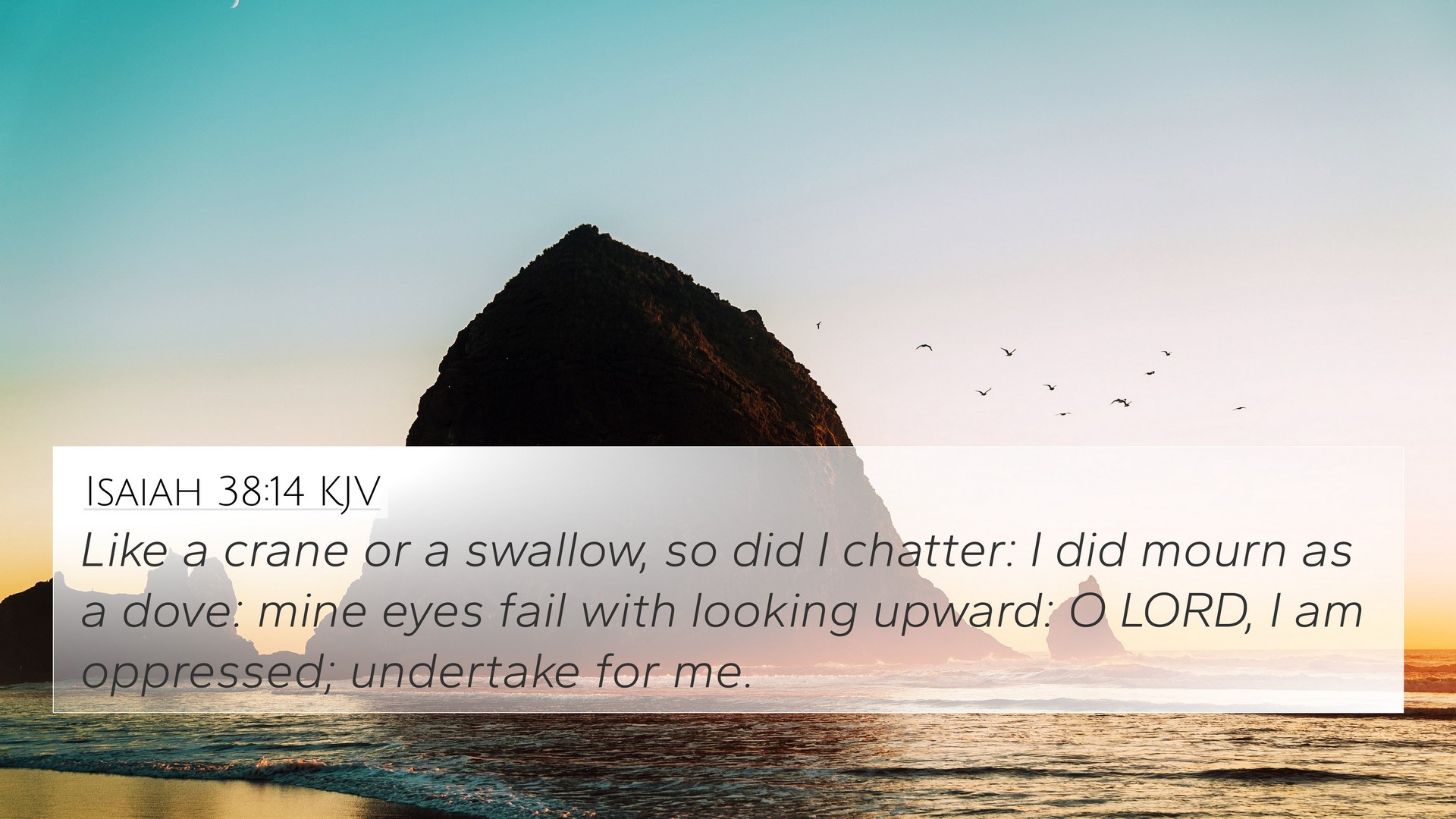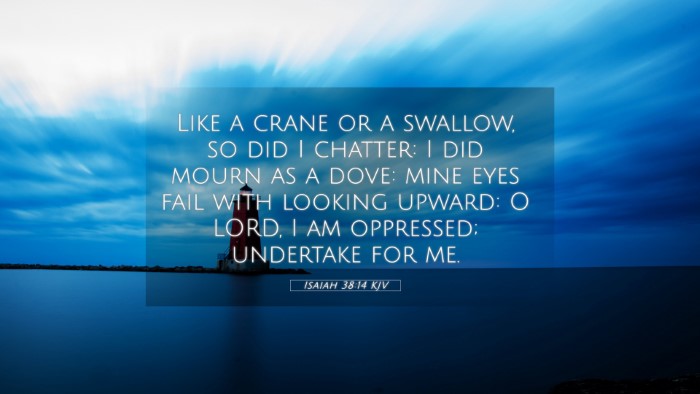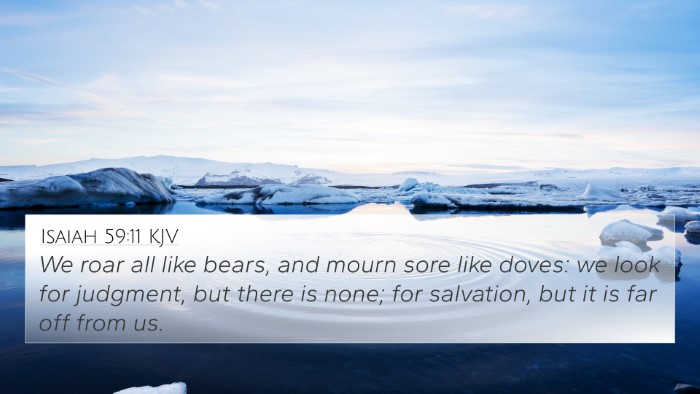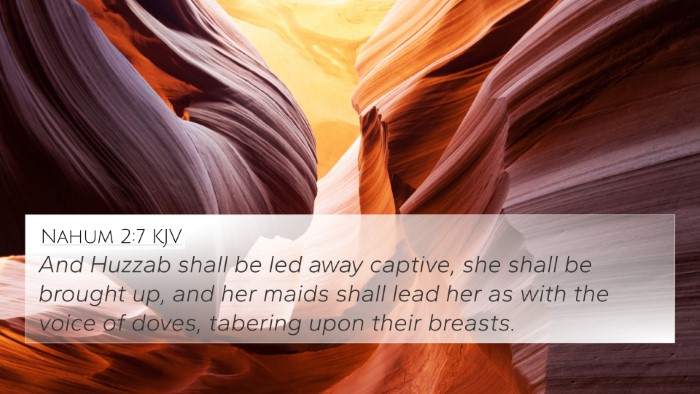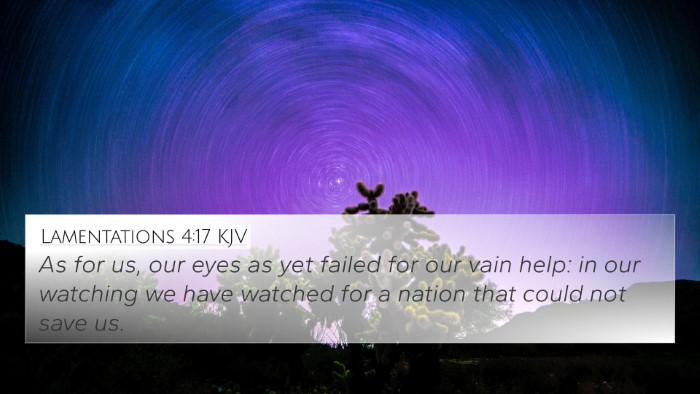Understanding Isaiah 38:14
“Like a crane or a swallow, so I chattered; I mourned like a dove; my eyes fail from looking upward. O Lord, I am oppressed; undertake for me!” (Isaiah 38:14, NKJV)
The verse Isaiah 38:14 offers a poignant reflection of sorrow and desperation expressed by the prophet Isaiah during a time of great personal crisis. This passage invites readers to delve into the emotional and spiritual turmoil present in the prophet’s plea to God. Below, we explore various public domain commentaries to derive deeper insights.
- Connection to Human Despair: Matthew Henry notes that Isaiah's imagery of a crane or swallow represents his deep lamentation. The use of avian imagery signifies a sense of helplessness and the fragility of life in the face of imminent death.
- Mourning and Prayer: Albert Barnes emphasizes that the cry of mourning indicates a continuous communication with God. Isaiah's lament symbolizes an earnest prayer, showcasing the profound connection between human sorrow and divine listening.
- Divine Intervention: Adam Clarke points out that the plea for God’s undertaking signifies a reliance on divine support during times of distress. The recognition of one's own weakness initiates a profound spiritual dialogue with God.
Commentary Insights
This verse encapsulates the depths of human emotion when confronting life-threatening circumstances. Isaiah's plea is a profound acknowledgment of his situation and a call for God’s intercession. Here are key takeaways from various commentaries:
- Matthew Henry: He highlights the significance of expressing sorrow openly and honestly to God, illustrating the necessity of lamentation in spiritual life.
- Albert Barnes: Observes that prayer often stems from a condition of desperation, where the emptiness of human strength leads one towards a deeper reliance on God.
- Adam Clarke: Suggests that lamentation is integral to faith, and that through acknowledging our plight, we invite divine engagement in our struggles.
Cross-References
This verse resonates with a variety of scriptural themes and verses that explore similar motifs of lamentation, divine rescue, and the human condition. Below are notable cross-references:
- Psalms 38:9-10: "Lord, all my desire is before You; and my sighing is not hidden from You." (Indicates the sincerity of prayer and sorrow before God.)
- Psalms 120:1: "In my distress, I cried to the Lord, and He heard me." (Reflects the essence of seeking God during times of anguish.)
- Lamentations 3:55-57: "I called on Your name, O Lord, from the depths of the pit; You heard my voice." (A direct echo of seeking God's attention amidst despair.)
- Hosea 14:2: "Take words with you, and return to the Lord." (Emphasizes the importance of returning to God in times of trouble.)
- James 5:13: "Is anyone among you suffering? Let him pray." (Highlights the call for prayer during suffering.)
- 2 Corinthians 1:8-10: "We do not want you to be uninformed... about the troubles we experienced..." (Paul's reflections resonate with Isaiah's outcry and reliance on divine aid.)
- Matthew 7:7: "Ask, and it will be given to you; seek, and you will find." (Reinforces the principle of seeking God in times of need.)
Thematic Connections
The mourning depicted in Isaiah 38:14 connects to broader biblical themes of supplication, lament, and God's responsive nature to human suffering. The following thematic connections can be drawn:
- Human Fragility: Both Isaiah and other biblical figures exemplify the delicate balance of faith and despair, underpinning the need for divine assistance.
- Prayer and Lament: The act of crying out to God during distress speaks to a recurring biblical theme found in the Psalms and the prophetic literature.
- Divine Help: Instances of God’s intervention in human crises are scattered throughout scripture, illustrating faithfulness to those who genuinely seek Him.
Conclusion
Isaiah 38:14 serves as a powerful reminder of the depth of human emotion in prayer and the profound need for divine intervention. Through a careful analysis of this verse alongside pertinent commentaries, it becomes clear that lamentation precedes a transformation in faith and trust towards God. The connections made with other scriptures amplify this message, illustrating the timeless nature of seeking God amidst life's tribulations. For those engaging in Bible study, utilizing tools for cross-referencing can enrich one's understanding of theological themes and prepare more in-depth sermon material.
